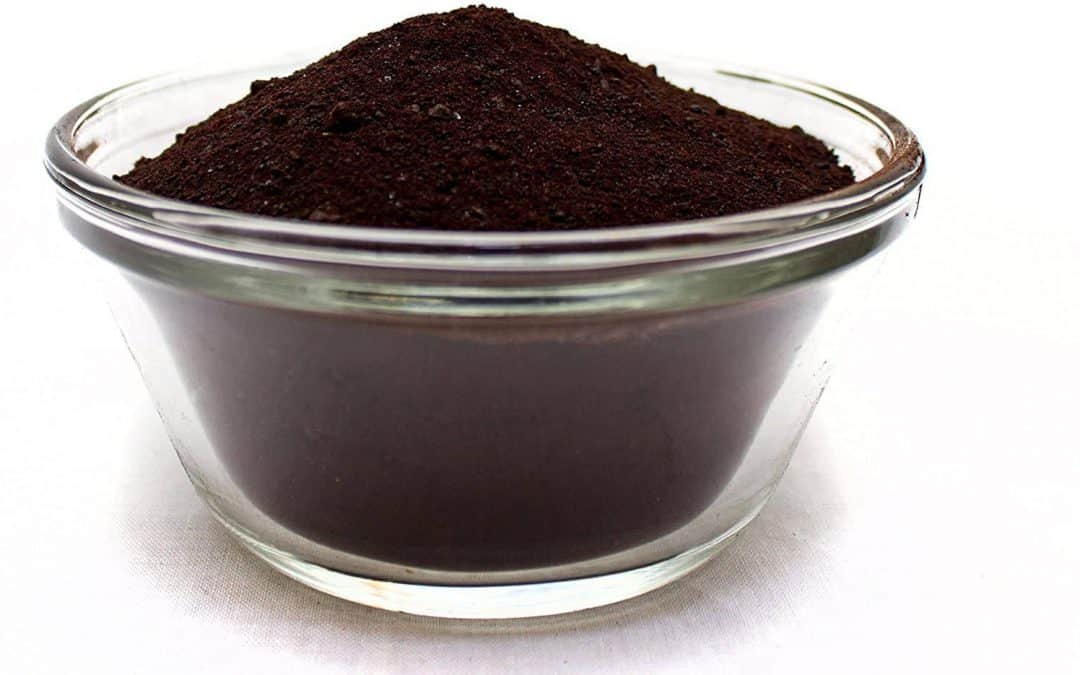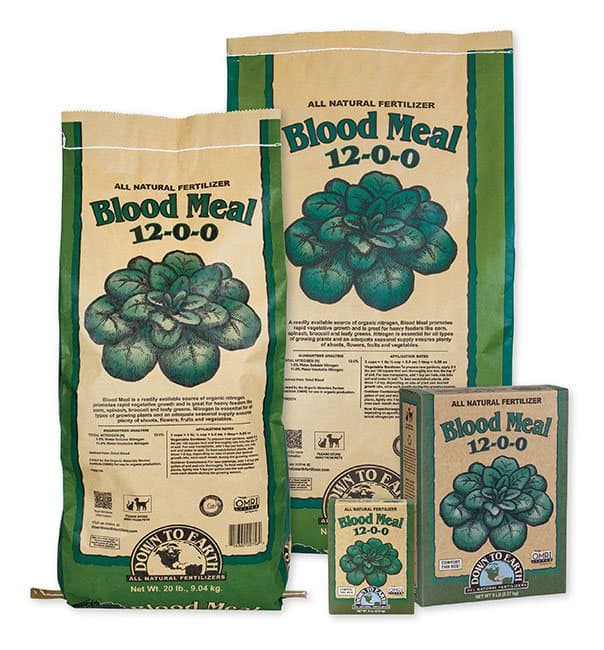Our Recommendations:
What Is Blood Meal
Well, it’s exactly what it sounds like…Blood meal fertilizer is a high nitrogen garden fertilizer made from dried animal blood (typically cattle blood). This soil nutrient booster is made for use in home gardens by collecting blood from animals after they’re slaughtered, then drying it up to make a powder.
Of the three main macro-nutrients needed by plants — namely part nitrogen, phosphorus, and potassium (collectively called as NPK) — this animal product has an extremely high nitrogen level, containing about 13.25% of this nutrient, with only around 1% of phosphorus and 0.6% of potassium. This is according to testing data shared on Wikipedia [external site]. There are also some micronutrients like zinc available to help support healthy soils.
With such a large amount of nitrogen, it is proven to be effective in promoting photosynthesis (or the process — majorly involving the green pigment chlorophyll — in which plants use sunlight to obtain nutrients from water and carbon dioxide, and therefore help in their growth and fruit production).
Is Blood Meal Fertilizer Considered Organic?

Blood meal is generally considered organic — granting that the animal where the blood was sourced was raised without being fed or injected with chemical-laden products. Though blood meals containing blood from commercially raised animals are officially regarded as organic, purists may argue otherwise.
While this is still a clear point of contention, many farmers view them as the better choice compared with chemical fertilizers. These synthetic fertilizers may deliver quicker results but they are known to kill beneficial soil microorganisms. Once they leach into groundwater, they can also cause water pollution due to excess nitrogen.
What Are The Benefits Of Blood Meal Fertilizer
Wondering why applying blood meal to your soil is one of the most recommended gardening tips? Here are its top benefits:
As mentioned, it acts as a rich source of nitrogen, which helps increase the acidity of the soil. This makes it one of the best additives to crops like peppers, onions, tomatoes, and squash. It’s also recommended to be used to side-dress heavy feeders including spinach, broccoli, and other leafy greens like cabbage, kale, brussels and lettuce.
Gardens that are being planted continually with different types of crops and vegetation easily lose soil nutrients. Blood meals help improve soil quality and return to its natural pH balance.
This fertilizer also adds vibrancy to gardens as it produces lush, deep-green foliage. Plus, it protects the beauty of your garden by keeping unwanted pests and animals like squirrels, rodents, and deer out of its premises.
How To Use Blood Meal

Blood meal application per se is generally easy. But it is important to conduct a garden soil analysis through a soil test kit to find out your soil’s current level and nutrient content. This will help identify how much blood meal you’d need for your garden or farm.
This product can be mixed directly into the top inches of your soil or blended with fresh compost. It can also be diluted with water first before adding to your garden. It’s advised to be applied during spring for maximum plant growth.
Gardeners, especially those who are into edible gardening, should nonetheless take note that this product is a slow-release fertilizer. Meaning, it may take a longer period (typically about a month) before the results of either blood meal or bone meal applications can be seen. So, it is best used on a steady, consistent basis.
Is It Safe To Use
Blood meals containing healthy animal blood are safe and good for your plants and other greens. Being a thoroughly dried meal, it is generally free of pathogens. When purchasing any new gardening product though, it’s vital to go through the label meticulously. Choose a brand that complies with industry standards and is duly certified, as it is true that some toxins can be carried via blood meals. These may be conveyed to your garden soil and ultimately to the plants and vegetables you’re growing.
What Are Its Substitutes

As stated, the NPK ratio of typical blood meal fertilizers are heavily geared towards nitrogen. If you’re looking for a substitute with high phosphorus content, you can opt for bone meal fertilizers instead. This organic soil booster is made from ground-up, and steamed animal bones. Bone meal is especially well-known for making roses have bigger, healthier new flowers.
More Gardening Help: Recipes – How to make homemade plant fertilizers
If you’re a vegan or just don’t want to use blood meal to grow your garden, you can resort to either feather meal or alfalfa meal (which has a generous portion of each NPK nutrient). The former is made from poultry feathers, while the latter is made from fermented alfalfa plants. Both alfalfa meal and feather meal can be used as accelerators for compost piles according to many articles like this one from the Redbud Soil Company.
Another option for vegan ingredients to find a good kelp fertilizer [link opens in new tab]. Finally, wool pellets have a 9-0-2 ratio and may be available at a local place like Allen Farm. The Allen family raises sheep for wool, and there’s probably somewhere close to you that does the same. They’ll likely have waste material you can simply pickup from time to time.
Where To Get Blood Meal
Fertilizers including blood meal and bone meal are best bought from your trusted local Nursery or Gardening Center. But with today’s threat of pandemic and for convenience purposes, edible gardening and farm enthusiasts are now getting products like this online through reliable e-commerce platforms.
At long last, we’re not all paranoid about tracking cookies anymore!
Expert gardeners advise us not to buy this organic fertilizer from a department store, as such low-priced blood meal products might contain ingredients from sources with lenient animal food quality practices.
One of the most helpful gardening tips we found when it comes to buying this soil amendment is to avoid ordering in bulk because of the semi-perishable nature. It’s best to purchase only the amount you need for one growing season.
What We Recommend
If you’re looking for organic fertilizer to help grow your urban garden, lawn, or farm — here are the blood meal brands we recommend:
Burpee Organic Blood Meal Fertilizer, 3 lb
Purely organic, this blood meal fertilizer is granulated and has no noticeable smell.
- It is easy to apply
- Know for creating no mess and dissolving cleanly and smoothly where it is placed.
- A bit pricey compared to other brands
- effective not only in boosting plant growth, but also in keeping animals away from your garden — from rabbits to moose to deer.
Espoma 163680 3 lbs Blood Meal Organic Fertilizer – DB03
It mixes with soil and delivers more quick results compared with other fertilizers.
- This all-natural nitrogen booster is an ideal supplement for both annuals and perennials
- It’s especially for sickly plants and vegetables.
- It provides a more economical way of keeping unwanted pests and animals out of your yard or gardens.
Check out our related article on Bone Meal Fertilizers
As you might have noticed, both of these gardening products do more than just give your plants a boost. Many wild animals and garden pests may be fearful of predators because of the smell. Many people buy it for this purpose and because it’s a more natural product than chemical lawn care products. Give it a try in your garden and let us know what you think in the comments below, visit our Facebook page or send us an email!





